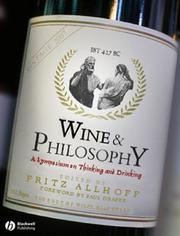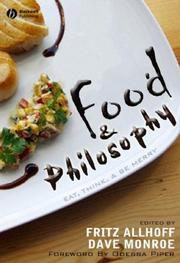| Listing 1 - 10 of 24 | << page >> |
Sort by
|

ISBN: 1281242888 9786611242886 140206912X 1402069111 9048177618 Year: 2008 Volume: 41 Publisher: [New York] : Springer,
Abstract | Keywords | Export | Availability | Bookmark
 Loading...
Loading...Choose an application
- Reference Manager
- EndNote
- RefWorks (Direct export to RefWorks)
There are a range of ethical issues that confront physicians in times of war, as well as some of the uses of physicians during wars. This book presents a theoretical apparatus which undergirds those debates, namely by casting physicians as being confronted with dual-loyalties during times of war. While this theoretical apparatus has already been developed in other contexts, it has not been specifically brought to bear on the ethical conflicts that attain in wars. Arguably, wars thrust physicians into ethical conflicts insofar as these wars create a tension between a physician’s obligation to heal and an obligation to serve some other good (e.g., military chain of command, national security, the greater good, etc.). Alternatively, we can debate whether this conception is appropriate. For example, one could argue that that non-medical duties cannot attach to physicians (e.g., due to nonoverlapping spheres of justice), thus abrogating the dual-loyalty challenge. Or else one could argue that these medically-trained personnel do not act qua physicians at all (but rather partisan advocates) and therefore duties that would otherwise attach to physicians do not attach here. In the first part of this book, these issues are debated. In the second part of the book, the dual-loyalties frame is used to explore various substantive debates that obtain when the military makes use of physicians. Physician involvement in torture is a heated topic, and certainly the most visible element of the debate. Also, however, we could use the dual-loyalties framework to explore issues in other arenas, such as: development of chemical and biological weapons, medical neutrality/battlefield triage, and so on. In each of these cases, the same tensions arguably exist: physicians have duties both to their patients and “elsewhere†(which, depending on the details of the view, could be any of the above-mentioned ends).
Medicine, Military --- Military ethics. --- Medical ethics. --- War --- Moral and ethical aspects. --- Medical aspects. --- War and morals --- Medicine and war --- War and medicine --- Biomedical ethics --- Clinical ethics --- Ethics, Medical --- Health care ethics --- Medical care --- Medicine --- Bioethics --- Professional ethics --- Nursing ethics --- Social medicine --- Ethics --- Military medicine --- Medicine, Naval --- Military hospitals --- Military hygiene --- Moral and ethical aspects --- Medical aspects --- Relief of sick and wounded --- Ethics. --- Philosophy (General). --- Philosophy, general. --- Deontology --- Ethics, Primitive --- Ethology --- Moral philosophy --- Morality --- Morals --- Philosophy, Moral --- Science, Moral --- Philosophy --- Values --- Philosophy. --- Mental philosophy --- Humanities
Book
ISBN: 9781405199957 Year: 2010 Publisher: Malden, Mass. Wiley-Blackwell
Abstract | Keywords | Export | Availability | Bookmark
 Loading...
Loading...Choose an application
- Reference Manager
- EndNote
- RefWorks (Direct export to RefWorks)
Philosophy of science --- Science --- Social sciences --- Philosophy. --- Social philosophy --- Social theory --- Normal science --- Philosophy
Book
ISBN: 9781402062087 1402062087 Year: 2008 Publisher: [London]: Springer,
Abstract | Keywords | Export | Availability | Bookmark
 Loading...
Loading...Choose an application
- Reference Manager
- EndNote
- RefWorks (Direct export to RefWorks)

ISBN: 9781402069123 Year: 2008 Publisher: Dordrecht Springer Science + Business Media B.V
Abstract | Keywords | Export | Availability | Bookmark
 Loading...
Loading...Choose an application
- Reference Manager
- EndNote
- RefWorks (Direct export to RefWorks)
Philosophy --- General ethics --- ethiek --- filosofie

ISBN: 9781405154314 Year: 2008 Publisher: Malden Blackwell
Abstract | Keywords | Export | Availability | Bookmark
 Loading...
Loading...Choose an application
- Reference Manager
- EndNote
- RefWorks (Direct export to RefWorks)
Drinking customs --- Wine and wine making --- Social aspects
Book
ISBN: 1280125934 9786613529794 0226014827 9780226014821 0226014835 9780226014838 9781280125935 Year: 2012 Publisher: Chicago London University of Chicago Press
Abstract | Keywords | Export | Availability | Bookmark
 Loading...
Loading...Choose an application
- Reference Manager
- EndNote
- RefWorks (Direct export to RefWorks)
The general consensus among philosophers is that the use of torture is never justified. In Terrorism, Ticking Time-Bombs, and Torture, Fritz Allhoff demonstrates the weakness of the case against torture; while allowing that torture constitutes a moral wrong, he nevertheless argues that, in exceptional cases, it represents the lesser of two evils. Allhoff does not take this position lightly. He begins by examining the way terrorism challenges traditional norms, discussing the morality of various practices of torture, and critically exploring the infamous ticking time-bomb scenario. After carefully considering these issues from a purely philosophical perspective, he turns to the empirical ramifications of his arguments, addressing criticisms of torture and analyzing the impact its adoption could have on democracy, institutional structures, and foreign policy. The crucial questions of how to justly authorize torture and how to set limits on its use make up the final section of this timely, provocative, and carefully argued book.
Torture --- Terrorism --- Moral and ethical aspects. --- Prevention --- terrorism, torture, morality, lesser of two evils, pain, violence, coercion, philosophy, ticking time bomb, democracy, foreign relations, diplomacy, war, counterterrorism, noncombatants, force, fear, emergency, utility, rights, absolutism, civil disobedience, warrants, necessity, self defense, nonfiction, politics, government, political science, military, interrogation, soldiers.
Book
ISBN: 9781119144816 Year: 2010 Publisher: Chichester : Wiley-Blackwell,
Abstract | Keywords | Export | Availability | Bookmark
 Loading...
Loading...Choose an application
- Reference Manager
- EndNote
- RefWorks (Direct export to RefWorks)
Science --- Social sciences --- Philosophy --- Philosophy.

ISBN: 9781405157759 1405157755 Year: 2007 Publisher: Malden, Mass. Blackwell
Abstract | Keywords | Export | Availability | Bookmark
 Loading...
Loading...Choose an application
- Reference Manager
- EndNote
- RefWorks (Direct export to RefWorks)
Food & Philosophy offers a collection of essays which explore a range of philosophical topics related to food; it joins Wine & Philosophy and Beer & Philosophy in in the "Epicurean Trilogy." Essays are organized thematically and written by philosophers, food writers, and professional chefs. Provides a critical reflection on what and how we eat can contribute to a robust enjoyment of gastronomic pleasures A thoughtful, yet playful collection which emphasizes the importance of food as a proper object of philosophical reflection in its own right
Book
ISBN: 1402062087 1402093853 9786611275938 1281875899 9786611875893 128127593X 1402062095 Year: 2008 Publisher: [Dordrecht?] : Springer,
Abstract | Keywords | Export | Availability | Bookmark
 Loading...
Loading...Choose an application
- Reference Manager
- EndNote
- RefWorks (Direct export to RefWorks)
Nanotechnology & Society is a collection of sixteen papers focused on the most urgent issues arising from nanotechnology today and in the near future. Written by leading researchers, policy experts, and nanoethics scholars worldwide, the book is divided into five units: foundational issues; risk and regulation; industry and policy; the human condition; and selected global issues. The essays tackle such contentious issues as environmental impact, health dangers, medical benefits, intellectual property, professional code of ethics, privacy, international governance, and more. FRITZ ALLHOFF, PhD, is an Assistant Professor of Philosophy at Western Michigan University and Research Associate in the Centre for Applied Philosophy and Public Ethics at The Australian National University. PATRICK LIN, PhD, is a Visiting Assistant Professor of Philosophy at California State Polytechnic University, San Luis Obispo, and has academic appointments at Dartmouth College and Western Michigan University. Both editors are also co-founders of The Nanoethics Group.
Nanomedicine. --- Nanotechnology -- ethics. --- Nanotechnology -- Moral and ethical aspects. --- Nanotechnology -- Social aspects. --- Nanotechnology. --- Socioeconomic Factors --- Nanotechnology --- Bioethical Issues --- Ethics --- Sociology --- Population Characteristics --- Miniaturization --- Natural Science Disciplines --- Social Sciences --- Technology --- Humanities --- Health Care --- Disciplines and Occupations --- Anthropology, Education, Sociology and Social Phenomena --- Technology, Industry, and Agriculture --- Technology, Industry, Agriculture --- Technology - General --- Philosophy --- Engineering & Applied Sciences --- Philosophy & Religion --- Molecular technology --- Nanoscale technology --- Moral and ethical aspects. --- Social aspects. --- Philosophy. --- Ethics. --- Philosophy and science. --- Philosophy of Science. --- Philosophy of Technology. --- High technology --- Science --- Mental philosophy --- Normal science --- Philosophy of science --- Deontology --- Ethics, Primitive --- Ethology --- Moral philosophy --- Morality --- Morals --- Philosophy, Moral --- Science, Moral --- Values --- Science and philosophy
Book
Abstract | Keywords | Export | Availability | Bookmark
 Loading...
Loading...Choose an application
- Reference Manager
- EndNote
- RefWorks (Direct export to RefWorks)
| Listing 1 - 10 of 24 | << page >> |
Sort by
|

 Search
Search Feedback
Feedback About UniCat
About UniCat  Help
Help News
News